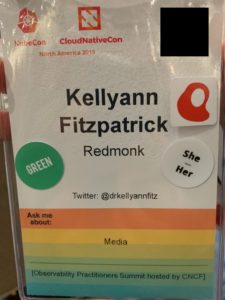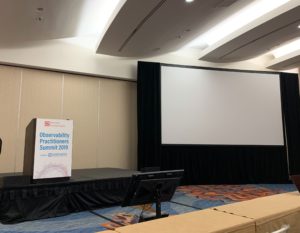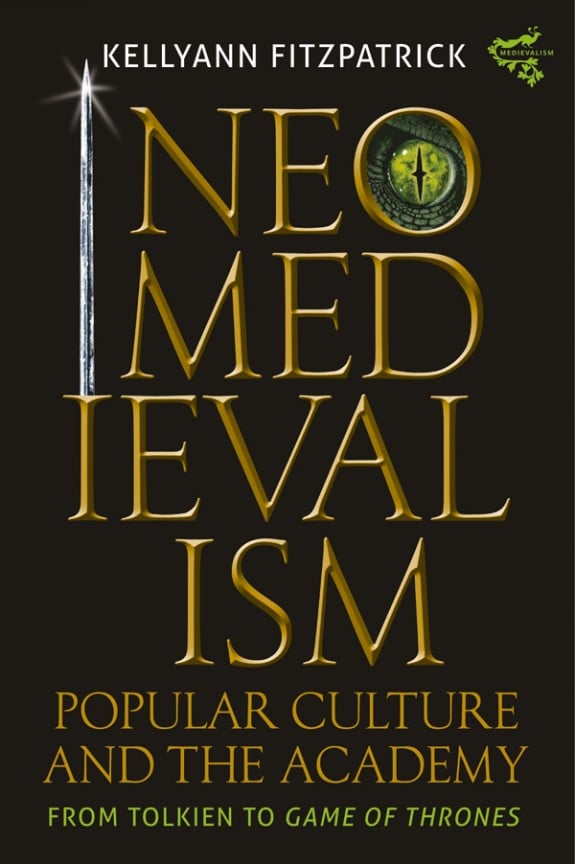2019 marks my first trip to KubeCon. For those of you who are not already in the know, the CNCF describes KubeCon + CloudNativeCon as such:
The Cloud Native Computing Foundation’s flagship conference gathers adopters and technologists from leading open source and cloud native communities in San Diego, California from November 18-21, 2019. Join Kubernetes, Prometheus, Envoy, CoreDNS, containerd, Fluentd, OpenTracing, gRPC, CNI, Jaeger, Notary, TUF, Vitess, NATS, Linkerd, Helm, Rook, Harbor, etcd, Open Policy Agent, CRI-O, and TiKV as the community gathers for four days to further the education and advancement of cloud native computing.
While KubeCon + CloudNativeCon Europe 2019 was held in Barcelona in May and KubeCon + CloudNativeCon China 2019 was held in Shanghai in June, KubeCon + CloudNativeCon North America 2019 is taking place in (so far) sunny San Diego, CA.

I am still in awe at how quickly my KubeCon schedule filled up with conference events, client meetings, receptions, and more casual meet up with folks for tacos and/or beer. With so much going on, I’ve decided to share my thoughts on each day’s events while they are still fresh in my mind. Ergo, I give you Day 0 of my KubeCon North America 2019 diary.
Conference preliminaries
When I arrived at the airport yesterday, the conference registration line located near baggage claim had a very short line, so I was able to quickly pick up my badge.

Following what I consider to be a conference best practice, the CNCF provided pronoun stickers to attendees. I was also offered the option of adding a conversation sticker to my badge. These are designed to allow an attendee to let let others know the level to which they prefer to engage in conversation. I chose green (indicating that I am willing to talk to anyone), but other options indicated “I want to talk to only people I know” and “I do not wish to talk.”
As a settled in at my hotel and scrounged up some pre-conference tacos, I checked through my Twitter feed to see how other conference attendees were settling in. I was delighted to see a number of returning attendees providing tips. In particular, I found this thread from Snyk’s Gareth Rushgrove to be useful:
Before #kubecon kicks off, I’m pondering a few things about first time attendees. I’ve been to most of the US events, and all the EU ones. So from a few hundred people to 12k or so this time around. Here’s a thread, starting with tips for first timers.
— Gareth Rushgrove (@garethr) November 17, 2019
The thread was also a nice reminder that I am far from the only first-time attendee.
The Observability Practitioners Summit
KubeCon offers a number of co-located events. Today I attended the Observability Practitioners Summit; having served on the programming committee for this year’s OPS, I was very much looking forward to all the talks on the agenda (and they did not disappoint).

Ted Young of LightStep served as MC for the event, which kicked off with a sponsor talk from LightStep. Nina Stawski of Splunk (via Omnition) delivered the first non-sponsor talk of the day on “Tracing is for Everyone (How Tracing Could Help Front-end Engineers to Build a Better UX).” Stawski discussed why observability should be on the radar of front-end engineers (one reason: UI often gets blamed when things go wrong), and also offered up an assessment of running the JS (Node) Open Telemetry Library in a browser (you can see the code here). It was also great to see OpenTelemetry make an appearance early in the program. A convergence of the OpenCensus and OpenTracing projects, OpenTelemetry is an open source observability framework that is currently in the alpha phase; a number of observability practitioners I spoke to at today’s summit are eager to see where the project goes next.
While I learned a lot from the rest of the day’s talks (including sponsor talks from New Relic and Dynatrace), I was particularly happy to see speakers from academia as well as the tech industry. The first of these speakers was Mania Abdi, a Ph.D. student at Northeastern University. Her talk, “Workflow Motif: An Abstraction for Debugging Distributed Systems,” posited that there is mismatch between how we build complex distributed systems (we use powerful abstractions) and how we debug systems (we use less sophisticated abstractions, and sometimes no abstractions). Workflow motif abstractions offer a potential solution to this mismatch.
The second talk from academia was presented by Emre Ates, a Ph.D. student at Boston University. His talk, “Pythia: An Automated, Cross-layer Instrumentation Framework for Diagnosing Performance Problems in Distributed Applications,” presents a framework “which explores the space of possible instrumentation choices and enables instrumentation needed to diagnose a newly-observed problem in production systems.” While Pythia made an appearance at the 2018 Observability Practitioner’s Summit, this talk provided both an introduction to the framework and an update on work done since last year. The OPS program wrapped up with a Q&A in which Ben Sigelman (LightStep) interviewed Rodrigo Fonseca (Associate Professor at Brown University) and Raja Sambasivan (Assistant Professor at Tufts University), providing yet another set of perspectives from academic research (as well as insightful questions from the audience).
Notably, while the talks themselves were not streamed, live coverage of the event was hosted by Liz Fong-Jones (Honeycomb) and Austin Parker (LightStep) on the OpenTelemetry Twitch stream. Many of the OPS speakers (and a few audience members like myself) dropped in to discuss some of their talk content in greater depth; viewers were also treated to some live coding. This led to one of what I am sure will be many points during KubeCon that I wish that I could clone myself (thereby watching the Twitch stream without missing any of the talks).
And so begin the receptions
I have many receptions on my dance card this evening: client happy hours, a reception just for analysts, and also a reception for the Observability Practitioners Summit. On top of this, Rachel and I are also hosting RedMonk beers.
We had grand ambitions of hosting you all somewhere cool, but that conflicted with our even grander ambitions of surviving this week.
Come say hi to the @redmonk #kubecon contingent:
Tonight.
8:30-ish.
Lobby of the Grand Hyatt.The tab will be open and the company delightful. https://t.co/brk798tt6z
— Rachel Stephens (@rstephensme) November 18, 2019
While it was no easy task to select a location in San Diego (which has a serious craft beer scene), in the end we chose a location based on convenience and accessibility as well as local beer selections. It is only Day 0, after all, and have at least another three days of KubeCon ahead of me.
Related posts:
- KubeCon North America 2019: Day 1
- KubeCon North America 2019: Day 2
- KubeCon North America 2019: Day 3
Disclaimer: The CNCF is a RedMonk client and paid for my T&E to KubeCon. New Relic and Snyk are RedMonk clients. LightStep, Splunk, Dynatrace, and Honeycomb are not currently RedMonk clients.

No Comments